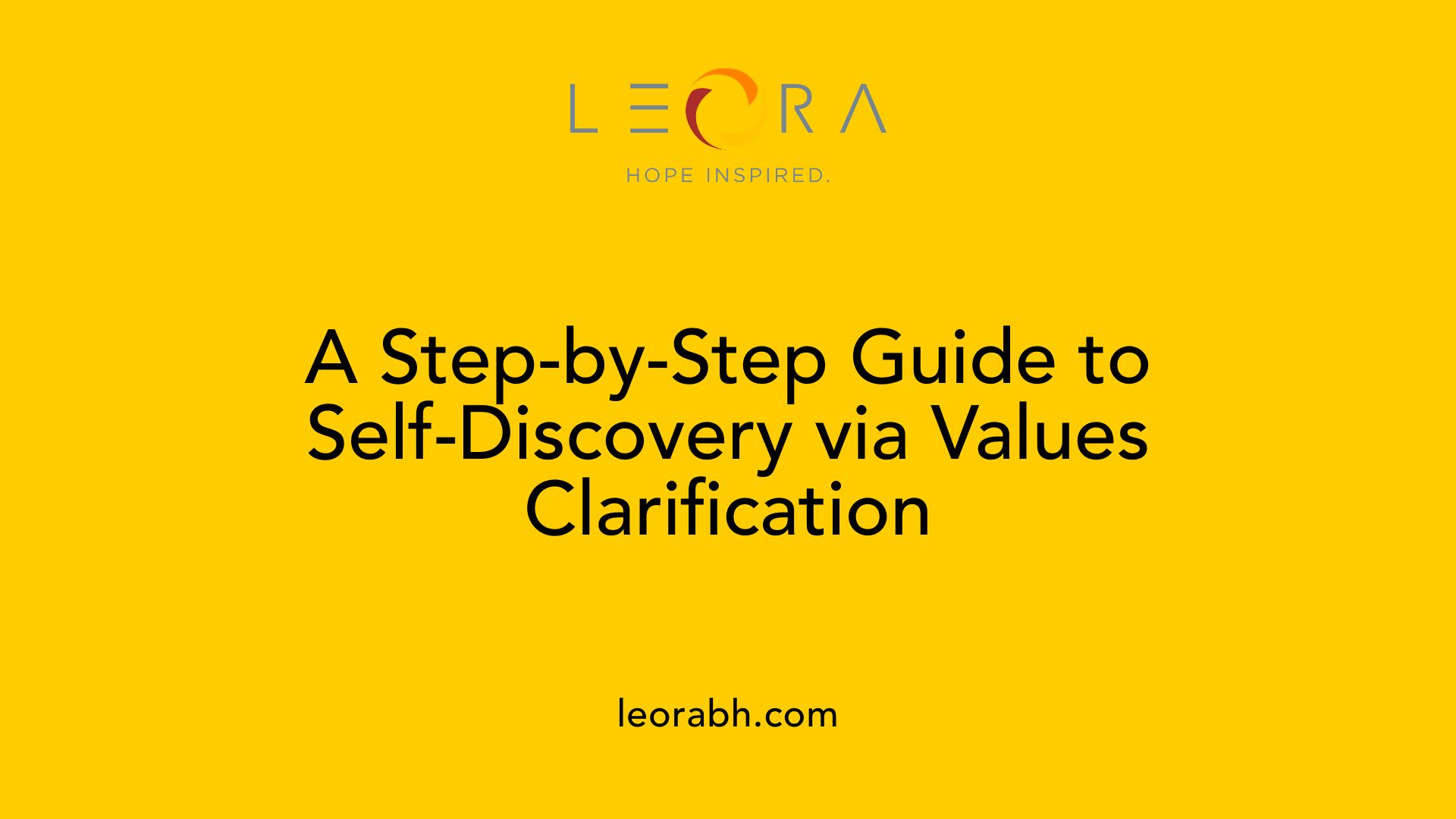The role of values clarification in long-term recovery
Unlocking Inner Strength: How Clarifying Values Fuels Long-Term Recovery
Understanding the Power of Personal Values in Sustaining Sobriety
Long-term recovery from addiction is a complex journey that extends beyond initial treatment. Central to this process is the concept of values clarification, a pivotal tool that helps individuals reconnect with their core beliefs and realign their actions accordingly. This article explores how values influence recovery, the methods to clarify personal values, and their critical role in fostering resilience, motivation, and sustainable change.
The Fundamental Role of Values in Recovery
Why are values important in recovery?
Integrating core values into the recovery process creates a supportive environment that guides individuals through their journey. Values serve as an internal compass, helping people make decisions that align with their beliefs and long-term well-being.
Practicing and reflecting on personal values makes it easier to navigate the emotional and psychological ups and downs faced during recovery. When actions reflect core principles such as honesty, respect, or responsibility, individuals often feel a greater sense of integrity and purpose.
Furthermore, values act as a personal accountability system. They remind individuals of what truly matters to them, which can reinforce commitment and reduce the risk of relapse. Aligning behaviors with personal ethics and morals fosters confidence, hope, and sustained motivation.
Incorporating values clarification into treatment has been shown to enhance self-efficacy — the belief in one’s ability to maintain sobriety. When people understand what they cherish most, they can set meaningful goals and develop strategies that support ongoing recovery.
Overall, focusing on personal values not only supports healthier choices but also helps rebuild identity beyond addiction, fostering resilience and long-term happiness.
Understanding Values Clarification in Recovery
What is values clarification in recovery?
Values clarification in recovery involves becoming fully aware of the personal values that influence your thoughts, feelings, and behaviors. It is a process of exploring and honestly acknowledging what truly matters to you at this point in your life, such as family, health, honesty, or spirituality.
This process begins with identifying your core values and understanding how these principles guide your decisions and actions. For example, if honesty is a key value, you may choose to be open and transparent in your relationships and recovery efforts.
Through activities like journaling, card sorts, or reflective conversations, individuals examine their beliefs and priorities. Recognizing conflicts between actions and values can motivate change and reinforce commitment to sobriety.
By clarifying your values, you can develop goals and behaviors that are aligned with what you deeply care about. This alignment makes your recovery journey more meaningful and sustainable.
Ultimately, values clarification empowers you to make conscious, intentional choices. These choices are consistent with your authentic self and support your growth past addiction. This process helps restore purpose, build resilience, and foster long-term success in recovery.
Steps in Values Clarification: A Guide to Self-Discovery

What are the steps involved in values clarification?
Values clarification is a process that helps individuals identify what truly matters to them. This process involves seven core activities that guide self-discovery and support recovery efforts.
The seven processes are:
- Prizing and Cherishing: Recognizing and valuing certain qualities or principles as important and worth maintaining.
- Sharing and Affirming: Expressing and reinforcing personal values through words, actions, or commitments.
- Choosing from Alternatives: Making deliberate choices among various options based on personal values.
- Weighing the Consequences: Considering the possible outcomes of actions to ensure alignment with core beliefs.
- Choosing Freely: Making decisions without undue pressure, ensuring actions are self-endorsed.
- Acting: Implementing choices and demonstrating commitment through behavior.
- Acting with Pattern and Consistency: Developing a consistent pattern of behaviors that reflect core values over time.
This process not only clarifies what an individual holds important but also strengthens motivation, fosters authenticity, and enhances recovery resilience. Engaging regularly in these activities helps individuals connect their actions with their personal beliefs, supporting sustained change and well-being.
Techniques like card sort exercises, journaling, and storytelling can facilitate these steps. They help in exploring conflicting values and making mindful decisions aligned with one's true self.
By actively practicing these processes, individuals can build a fulfilling recovery journey rooted in genuine self-understanding and intentional living.
Values as a Foundation for Decision-Making and Behavior Change
How can values influence our self-recovery?
Values play a crucial role in guiding behavior and fostering resilience during the recovery process. They act as moral compasses, helping individuals make choices that are consistent with their deeply held beliefs. For example, core values like honesty, integrity, and transparency are especially significant in self-recovery settings, such as those inspired by Christian principles, exemplified by institutions like Clearfork Academy. These values promote truthfulness and accountability, which are vital for emotional healing and building trust in oneself and others.
Furthermore, values such as honor, unity, and sacrifice encourage supportive relationships and a sense of purpose. When individuals align their actions with such principles, they reinforce positive behaviors that sustain sobriety. Motivational aspects are also tied to values like excellence and fun, which help maintain enthusiasm and optimism throughout the recovery journey. Aligning actions with these core beliefs not only fosters discipline but also instills hope, making recovery a more meaningful and achievable goal.
Why are values important in recovery?
Integrating personal values into recovery frameworks creates a nurturing environment that promotes stability and growth. When individuals identify and live according to their values, they develop an internal moral guide that makes it easier to navigate the inevitable challenges and setbacks common in recovery.
Practicing values also helps establish a personal accountability system. This system encourages individuals to stay committed to their goals and can act as a safeguard against relapse. In fact, values clarification—an active process of exploring and understanding what matters most—can transform the recovery experience by providing clarity and purpose. As a result, individuals are better equipped to face cravings, triggers, and emotional lows because they have a clear sense of why sobriety is important to them.
Connecting values with choices and long-term goals
A values-based approach to recovery encourages setting SMART (Specific, Measurable, Achievable, Relevant, Time-bound) goals that reflect individual beliefs and aspirations. For instance, someone might prioritize honesty and responsibility, translating these into daily actions such as being truthful in interactions and fulfilling commitments.
Through techniques like journaling, card sort exercises, or visualization, individuals can clearly identify their core values and connect them with tangible, long-term goals. By making decisions that align with their values, they create a sense of coherence and purpose, which reinforces their motivation. Over time, this process helps rebuild identity beyond the addiction, fostering resilience and empowering continuing growth.
The role of values in resilience and motivation
Living according to personal values strengthens resilience by providing a stable foundation for emotional and psychological endurance. When individuals remain aligned with their core beliefs, they are more likely to persist through setbacks and maintain their commitment to long-term sobriety.
Values serve as a source of intrinsic motivation, which is critical in recovery. They help individuals find meaning in their efforts and remind them of what truly matters, especially during difficult times. Techniques such as mindfulness and experiential exercises in therapies like Acceptance and Commitment Therapy (ACT) actively reinforce the importance of values in promoting psychological flexibility.
In sum, values offer guidance, foster motivation, and underpin resilience, making them indispensable in the journey of addiction recovery.
Values and Motivation: Keeping the Fire Alive in Recovery
How do personal values influence motivation during recovery?
Connecting recovery activities with personally salient long-term goals through values clarification plays a vital role in sustaining motivation. Values function as an internal moral compass and a wellspring of intrinsic motivation, inspiring individuals to persevere through difficulties. When recovery efforts align with deeply held beliefs and priorities, individuals find a renewed sense of purpose that can propel them forward, even when facing setbacks.
By reflecting on values such as honesty, responsibility, or health, people in recovery can establish meaningful goals that resonate with their core self. These goals serve as constant reminders of what truly matters, helping to reinforce commitment and resilience. Techniques like journaling, visualization, and card sort exercises can help uncover these guiding principles, making them more accessible during times of doubt.
Ultimately, this alignment encourages persistence in recovery routines and decision-making, making the journey more purposeful and manageable.
What role does values play in resilience during recovery?
During recovery from addiction, resilience is essential for managing emotional strain and resisting relapse triggers. Personal values provide a robust internal resource—an anchor that supports individuals in facing adversity with strength. When actions are consistent with core beliefs, individuals tend to experience higher levels of satisfaction, contentment, and a sense of integrity.
Living according to one's values helps to foster emotional stability and self-esteem, which are crucial in bouncing back from setbacks. For example, valuing health and community can motivate someone to seek social support or practice healthy habits, reinforcing their capacity to recover.
Research suggests that these deeply held beliefs create a foundation of resilience, enabling individuals to withstand the psychological demands of recovery. Clarifying and actively aligning daily behaviors with personal values strengthen inner resolve, making it easier to navigate complex recovery challenges.
| Aspect | Impact | Explanation |
|---|---|---|
| Motivation | Sustained effort | Values connect daily activities to long-term life goals, maintaining motivation. |
| Resilience | Psychological strength | Values reinforce self-identity and purpose, bolstering resilience. |
| Behavior alignment | Reduced conflict | Living according to values diminishes internal conflicts and emotional distress. |
Focusing on personal values during recovery is a practical way to foster resilience, providing both direction and emotional support. Regular reflection and values-centered goal setting can further help individuals build a sustainable, purpose-driven recovery journey.
Values Clarification Enhances Self-Efficacy and Treatment Engagement
 Research indicates that incorporating values clarification exercises into addiction treatment can significantly boost an individual's confidence in maintaining sobriety. A notable study involving individuals in early residential treatment for opioid use disorder found that a simple, short values clarification activity led to an increase in self-efficacy for abstinence. While the exercise did not alter the participants' commitment levels to abstinence, their belief in their ability to stay sober was markedly improved. This suggests that values clarification reinforces internal confidence, empowering individuals to navigate recovery challenges.
Research indicates that incorporating values clarification exercises into addiction treatment can significantly boost an individual's confidence in maintaining sobriety. A notable study involving individuals in early residential treatment for opioid use disorder found that a simple, short values clarification activity led to an increase in self-efficacy for abstinence. While the exercise did not alter the participants' commitment levels to abstinence, their belief in their ability to stay sober was markedly improved. This suggests that values clarification reinforces internal confidence, empowering individuals to navigate recovery challenges.
Values clarification is more than just identifying what matters most; it actively contributes to sustained treatment adherence. By helping clients connect their daily behaviors with their core beliefs, this process fosters a sense of purpose and personal integrity. Such alignment encourages ongoing engagement with recovery programs because individuals are working toward goals that resonate deeply with their sense of identity.
In addition, aligning actions with personal values can mitigate ambivalence and reduce feelings of conflict, which are common barriers in treatment. When people see how their recovery behaviors support their cherished principles—like honesty, responsibility, or health—they are more likely to persevere through obstacles. This value-based approach provides a moral compass, guiding decision-making even during difficult times.
Furthermore, the integration of values clarification in psychosocial interventions demonstrates practical benefits. It enables clinicians to tailor treatment plans that reflect clients' specific values, increasing the likelihood of adherence and success. The process can include exercises like card sort activities, journaling, or storytelling that help clients articulate and reinforce their personal guiding principles.
Connecting recovery efforts to meaningful personal objectives ensures that sobriety is not merely an obligation but an integral part of a fulfilling life. This deep connection offers intrinsic motivation, which is crucial for long-term recovery. Consequently, incorporating values exploration into treatment routines is a vital component in fostering resilience and reducing relapse risk.
| Aspect | Impact | Additional Notes |
|---|---|---|
| Self-efficacy | Increased after values exercise | Reinforces belief in personal ability |
| Treatment adherence | Improved | Encourages ongoing engagement |
| Motivation | Enhanced | Connects behaviors with core personal goals |
| Emotional well-being | Supports contentment | Aligns actions with personal identity |
| Intervention strategies | Effective | Includes exercises, reflection, and planners |
Emphasizing the importance of values in recovery underscores their role as internal guides that promote healthier choices and lasting change. Regular reflection and clarification of personal values can help individuals stay committed, find purpose in their recovery journey, and ultimately achieve a more satisfying and meaningful life post-addiction.
Long-Term Benefits of Values Clarification in Recovery

What are the long-term benefits of values clarification?
Living in harmony with personal values offers enduring benefits in the recovery journey. When individuals align their behaviors with what they truly find meaningful, they often experience increased contentment, satisfaction, and a sense of integrity. These qualities reinforce their commitment to sobriety, making it easier to sustain positive changes over time.
Regularly reflecting on one's core beliefs and priorities helps keep recovery strategies relevant as life circumstances evolve. As people encounter new experiences or challenges, their values might shift or deepen, and ongoing reflection ensures that their recovery plans adapt accordingly. This adaptability fosters resilience and persistence in maintaining sobriety.
Furthermore, clarifying and living according to personal values can foster a stronger sense of purpose and identity beyond addiction. This process supports emotional well-being by reducing feelings of guilt, shame, or discontent associated with acting against one’s core principles.
In the long term, maintaining a clear connection to personal values encourages continuous growth, helps manage cravings and triggers, and sustains motivation during difficult periods. Overall, values clarification is a powerful tool for fostering a meaningful, fulfilling life post-recovery.
The Practical Application of Values Clarification in Therapy and Support Systems

How is values clarification used in evidence-based therapies?
Values clarification is a fundamental component of many effective psychosocial treatments for addiction, particularly within the framework of Acceptance and Commitment Therapy (ACT). In ACT, this process helps individuals identify what genuinely matters to them—such as health, honesty, or connection—and then align their behaviors accordingly. Therapists often guide clients through exercises like reflecting on core values, creating visualizations of a values-driven future, or engaging in storytelling to clarify what they find most meaningful.
By emphasizing personal values, ACT aims to foster psychological flexibility, which is essential for maintaining sobriety over the long term. Recognizing and committing to values provides a moral compass that motivates individuals, reinforces their dedication to recovery, and helps them navigate challenges. For example, a person who values honesty may find it easier to confront difficult truths or admit setbacks, which are critical steps in the recovery journey.
Research shows that integrating values clarification within therapy can enhance self-efficacy for abstinence, especially during early recovery stages. A brief values exercise, for example, has been shown to increase individuals' confidence in their ability to stay sober, even if it does not significantly alter motivation levels related to commitment.
What is the role of clinicians and peer support in facilitating values clarification?
Clinicians have a vital role in guiding clients through values clarification exercises by creating a safe, non-judgmental environment. They facilitate reflective activities, help clients articulate their most important principles, and connect these values to their recovery goals. This guidance helps diminish ambivalence and fosters a sense of purpose, making sustained recovery more attainable.
Peer workers bring unique strengths to this process, primarily through their lived experience with addiction and recovery. They serve as powerful role models, demonstrating that change is possible when actions align with personal values. Peer staff can share their journeys of rediscovering or re-establishing core values, thereby inspiring hope and resilience.
Both clinicians and peers can employ specific techniques such as card sort exercises, where clients prioritize their values; journaling and storytelling to explore personal beliefs; and visualization to imagine a future living according to those values. These methods help reinforce the importance of values, making them tangible and actionable.
Importantly, peer workers' shared experiences with addiction and recovery lend authenticity to the process, fostering trust and motivation. They serve as living examples of how aligning actions with core beliefs can support lasting change, ultimately empowering clients to take active roles in their recovery.
Overall, integrating values clarification into therapy and peer support enhances engagement, boosts self-efficacy, and provides a moral roadmap for individuals navigating the complex path of addiction recovery. Incorporating these exercises into treatment plans ensures that recovery efforts are rooted in personal meaning, increasing the likelihood of enduring success.
Implementing Values Clarification in Long-Term Recovery Strategies

How can values clarification be integrated into long-term recovery planning?
In long-term recovery, regularly revisiting personal values is essential for maintaining commitment and adapting to changing life circumstances. Incorporating structured exercises—such as card sort activities, journaling, visualization, and storytelling—helps individuals identify and reaffirm what truly matters to them.
These exercises serve as ongoing tools for reflection, enabling individuals to align their daily behaviors with their core beliefs. This alignment fosters resilience, provides a moral compass during challenging times, and encourages informed decision-making.
Decision aids and interactive tools play a vital role in facilitating this process. For example, multimedia platforms or digital apps can guide users through identifying their values, prioritizing them, and setting meaningful goals. Multicriteria decision analysis is one recommended approach, as it helps weigh various options against personal values, reducing uncertainty and conflict.
Regularly revisiting values can also help identify shifts over time, ensuring that recovery strategies remain relevant and personalized. By periodically reflecting on their evolving beliefs and aspirations, individuals reinforce their identity beyond the addiction and sustain motivation.
In essence, integrating values exercises into long-term recovery plans involves combining practical activities with decision-support technology, allowing for continuous growth and alignment. This dynamic approach supports individuals in navigating relapse risks, making informed lifestyle choices, and pursuing a meaningful, value-driven life.
Connecting Personal and Societal Values for Holistic Recovery
How do social and shared values influence addiction risk and recovery?
Social and shared values significantly impact an individual's journey through addiction and recovery. When positive societal values such as honesty, kindness, and respect are upheld within communities, they create an environment conducive to healing and support. Conversely, environments where harmful behaviors are normalized can increase addiction risks.
Shared societal beliefs influence personal decision-making and shape community attitudes towards addiction and recovery. By fostering supportive social norms and reinforcing community-connectedness, these values help individuals feel accepted and motivated to pursue sobriety.
What role does community support and role models play in recovery?
Community support and role models are vital in maintaining long-term recovery. When individuals see community members exemplify values like responsibility, caring, and resilience, they gain motivation and hope. These role models serve as living proof that recovery is possible, overcoming stigma and fostering belonging.
Peer support groups, community programs, and mentorships rooted in shared positive values can encourage individuals to stay committed to sobriety. Such environments reinforce the importance of collective effort and shared responsibility in sustaining recovery.
How can societal values enhance recovery efforts?
Societies that promote inclusive, empathetic, and health-oriented values facilitate healthier lifestyles and provide a foundation for recovery programs. Public policies emphasizing mental health, social support systems, and community engagement align with core values that promote well-being.
Efforts to educate communities about the importance of values like acceptance and responsibility can help diminish shame and foster a culture of understanding. When society collectively upholds these principles, it creates an ecosystem where recovery not only becomes accessible but also normalized.
| Aspect | Role in Recovery | How Society Supports Example |
|---|---|---|
| Social Norms | Influence individual behaviors and attitudes | Campaigns promoting openness and empathy |
| Community Support | Provides emotional and practical help | Community-led recovery programs and peer mentoring |
| Role Models | Inspire hope and demonstrate recovery | Public figures sharing their stories of overcoming addiction |
By integrating societal values into recovery frameworks, communities can foster environments that bolster resilience, promote hope, and support sustained sobriety for individuals on their recovery journey.
Embracing Values for a Vibrant, Sobrious Future
In conclusion, values clarification is a vital component in the journey toward lasting sobriety. By consciously identifying and living in accordance with what truly matters, individuals cultivate resilience, motivation, and a sense of purpose. Therapeutic approaches like ACT and psychosocial support systems facilitate this process, ultimately empowering individuals to lead authentic, fulfilling lives free from addiction. Incorporating regular reflection on personal and societal values ensures that recovery remains a dynamic, meaningful pursuit, setting the stage for a vibrant, sober future.
References
- Why Values Matter in Addiction Recovery | Defining Your Values
- Values clarification in early recovery from opioid use disorder
- Values Can Be a Conduit to Recovery | Psychology Today
- Exploring Values Clarification and Health-Literate Design in Patient ...
- A Guide to Building on Your Values to Beat Addiction
- Acceptance and Commitment Therapy (ACT) for Addiction Recovery
- Staying Grounded: Embracing Your True Self in Addiction Recovery
- How Acceptance and Commitment Therapy (ACT) Supports Long ...
- [DOC] Module 3-The Importance of Role Clarity for All Parties
- The Importance of Values - Renaissance Ranch
Find Your Inner Light
Related Articles
Schedule an Assessment
Leora Behavioral Health provides comprehensive treatment services, including ambulatory detox, mental health IOP, and SUD IOP, to support your journey toward lasting recovery.
Our caring team will guide you through the admissions process and create a personalized treatment plan tailored to your unique needs. We welcome walk-ins. If you or a loved one is struggling, reach out today. We’re here to help.


.svg)




.svg)
.svg)
.svg)
.svg)
